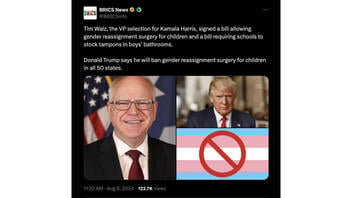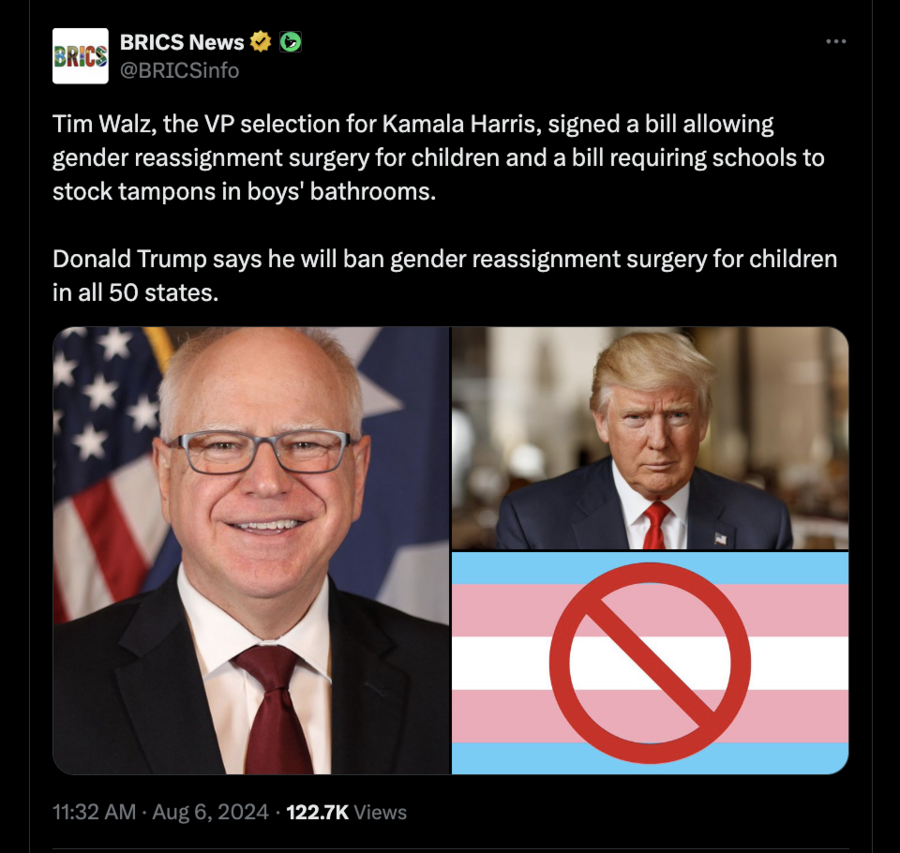
Did Minnesota Gov. Tim Walz sign a bill "allowing gender reassignment surgery for children"? No, that's not true: No state law sets a specific minimum age for gender-affirming surgical interventions, a Minnesota lawmaker told Lead Stories. Major health care providers do not operate on people under 18. One bill signed into law protects youth access to those services discussed in broad terms, but doesn't address a specific age.
The claim reproduced a frequent misconception about gender-affirming care: It ignores that such care is not limited to surgeries and includes many other treatments such as mental health services, puberty blockers and hormone therapies.
The claim appeared in a post (archived here) on X, formerly known as Twitter, on August 6, 2024, by @BRICSinfo. It said:
Tim Walz, the VP selection for Kamala Harris, signed a bill allowing gender reassignment surgery for children and a bill requiring schools to stock tampons in boys' bathrooms. Donald Trump says he will ban gender reassignment surgery for children in all 50 states.
This is what the post looked like on X at the time of writing:
(Source: X screenshot taken on Wed Aug 7 15:37:05 2024 UTC)
What are the laws?
Rep. Leigh Finke (archived here) who sponsored several key bills concerning gender-affirming care in Minnesota, told Lead Stories via email on August 8, 2024:
No law in Minnesota has been passed addressing the age of receiving gender affirming care, including surgery. We simply protected access to gender affirming care as it already existed for those who require it ...
Standards of care in Minnesota follow the national and international guidelines for gender affirming care. Like all heathcare decisions, gender affirming care is highly personal and individualized. Families, patients, and doctors are best able to make those decisions, not the government.
Minnesota's largest providers of gender affirming care do not perform any surgeries on individuals under 18.
Neither legislation about youth transgender health (archived here), sometimes referred to as the "trans refuge" law (archived here), nor the Governor's Executive Order on "Protecting and Supporting the Rights of Minnesota's LGBTQIA+ Community Members to Seek and Receive Gender Affirming Health Care Services" (archived here) contains any provisions overriding existing medical protocols or sets a specific minimum-age bar for what the post called "gender reassignment surgery."
Both pieces of legislation went into effect in 2023. They discuss gender-affirming care in general terms to ensure that those who need care recognized as medically necessary (archived here) by the Centers for Disease Control and Prevention, can safely access it.
Neither define such care exclusively as surgery. In reality, gender care can be many other things (archived here). The transgender refuge law doesn't even explicitly mention surgical interventions -- it focuses on mental health services and other aspects of gender-affirming care.
Finke, a member of the Minnesota Democratic-Farmer-Labor Party, added:
In 2024, I carried a bill to require gender affirming care coverage among certain health care plans in the state of Minnesota. This law also did not address standards of care, including age. At no point has Minnesota legislature in the past two years passed legislation to change the standards of gender affirming care--including the age at which surgery could be conducted-- in Minnesota.
In June 2023, the Minnesota Reformer news website reported (archived here) that "most medical centers require individuals to be at least 18 years old for bottom surgery and chest, or 'top,' surgery."
In the spring of 2024, as Minnesota's gender care legislative actions made the news, Dr. Angela Kade Goepferd, chief education officer and medical director of the Gender Health program at Children's Minnesota, told MPR (archived here), a local public radio station, that the state does not perform gender-affirming surgeries on patients under 18 years old.
Lead Stories searched Minnesota statutes, laws and rules, but did not find anything that would explicitly set a minimum age for gender-affirming surgeries.
What are the surgeries?
"Gender (or sex) reassignment surgery" (archived here), as the post on X calls it, is an outdated term (archived here). It was once used primarily to refer to the medical interventions that change a person's genitalia.
The World Professional Association for Transgender Health (WPATH) manual (archived here) -- one of the most authoritative sources of evidence-based gender care recommendations -- suggests on page 59 the term "gender-affirming surgeries," instead, . The current term incorporates several more interventions, and not all of them concern genitalia or the chest area, according to the appendix, attached to Chapter 13.
The newer term and its definition are consistent with the wording used by Minnesota's Department of Human Services (archived here).
Who counts as a child?
In Minnesota, a child, or a minor, is any person younger than 18 (archived here). After that, a person is generally considered an adult for many legal purposes. Though certain restrictions are still applicable (archived here), that does not include required parental consent when it comes to health care (archived here).
For gender-affirming care, however, "child" is not a blanket term for anyone under 18: People go through several developmental stages between birth and adulthood, and health care professionals consider that while deciding what is appropriate and medically necessary.
For example, the WPATH guidelines (archived here) differentiates between children, pubescent youth and adults, as seen on page 67:
Unlike pubescent youth and adults, prepubescent gender diverse children are not eligible to access medical intervention (Pediatric Endocrine Society, 2020); therefore, when professional input is sought, it is most likely to be from an HCP [health care professional] specialized in psychosocial supports and gender development.
While WPATH suggests that there might be some benefits if vaginoplasty is performed before the age of 18, that appears to offer some flexibility -- not a blanket recommendation. At the same time, the organization still strongly advises against phalloplasty before that age.
The Minnesota Department Human Services (archived here) prohibits one particular surgery -- phalloplasty -- before 18. In any case, the agency requires authorization for any other gender-affirming surgery, listing additional requirements for those younger than that age.
Trans youth and genital surgeries
Lead Stories was not able to locate any Minnesota-specific data about gender-affirming surgeries performed on people under 18, but available national statistics confirmed that genital surgeries in that age category are incredibly rare.
For example, a 2022 Reuters story (archived here), citing an analysis of insurance claims for roughly 330 million U.S patients over five years, reported that:
The Komodo analysis of insurance claims found 56 genital surgeries among patients ages 13 to 17 with a prior gender dysphoria diagnosis from 2019 to 2021.
A 2023 study (archived here) published by the American Medical Association's JAMA Network Open, a peer-reviewed medical journal, read:
... breast and chest procedures made up a greater percentage of the surgical interventions in younger patients, while genital surgical procedures were greater in older patients.
A 2024 article in JAMA Network Open (archived here) found that among minors who had gender-affirming surgeries in 2019, 96.4 percent -- or 82 out of 85 cases -- were chest-related procedures, not genital surgeries.
Lead Stories contacted Minnesota Gov. Walz about the claim that is the target of this fact check. If we get a response, the article will be updated as appropriate.
About @BRICKinfo
The same account on X that posted the claim that is the focus of this fact check previously published a misleading statement about President Joe Biden before he dropped out of the presidential race. Lead Stories debunked it here.
Further reading
Lead Stories previously debunked false claims about transitions in toddlers here. Other Lead Stories fact checks concerning claims about transgender issues can be found here. Fact checks of claims about the 2024 U.S. presidential election are here.


















